Our history
Wow, we’ve come so far since East Anglian Air Ambulance was founded in 2000 - and it’s all thanks to you! Every milestone, every mission, every person we’ve helped has been possible because of your incredible donations and support. Here’s to the people you’ve saved, the many thousands of lives you’ve touched and the story you’ve written.
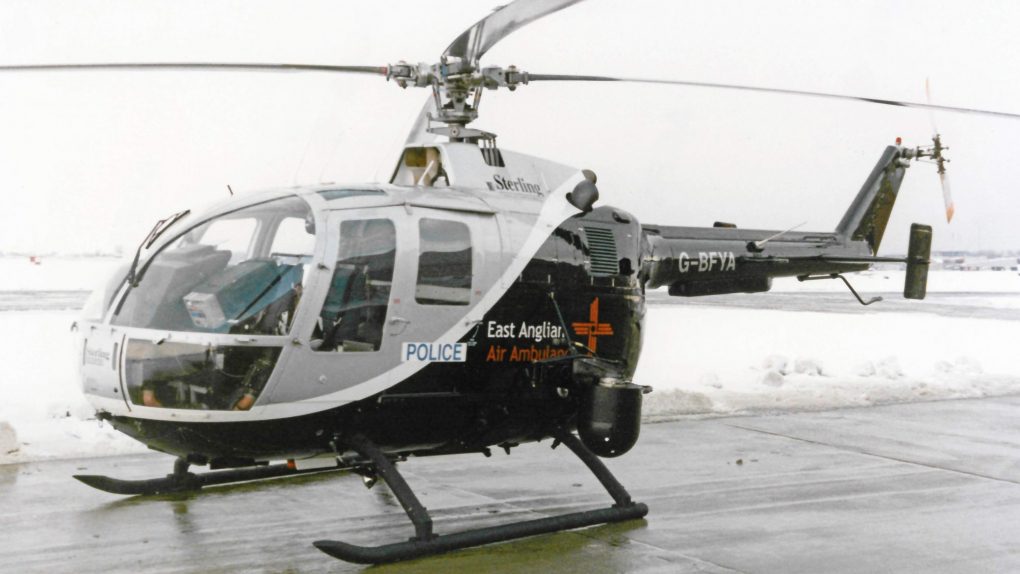
2000: East Anglian Air Ambulance was founded
August 2000: An appeal was launched by Andrew Egerton-Smith MBE with the help of Italian horse racing jockey Frankie Dettori MBE to operate our first helicopter.
September 2000: East Anglian Air Ambulance registered with the Charity Commission and Companies House. The first trustees joined the charity and included Andrew Egerton-Smith MBE, Richard King CBE, Michael Falcon CBE and David Barker MBE.
2001: The AA became a major sponsor of EAAA, which is why our helicopters are yellow. The initial flights were once a week in the BO105 helicopter, provided by Sterling Helicopters, with two paramedics on board. In April, EAAA’s service increased from one day a week to five (daytime).
July 2001: East Anglian Air Ambulance became operational seven days a week (daytime)!
2002: Volunteer doctors started flying with EAAA, including Dr Jeremy and Dr Victor who are still with the charity today. A Bolkow 105 G-EYNL became EAAA’s dedicated aircraft and EAAA had a temporary base at Red Lodge Karting Centre, before moving to RAF Honington.
November 2006: The Bolkow BK117 is ordered from Germany, and we end the year with the service becoming ever busier, with missions up by 20% on the previous year.
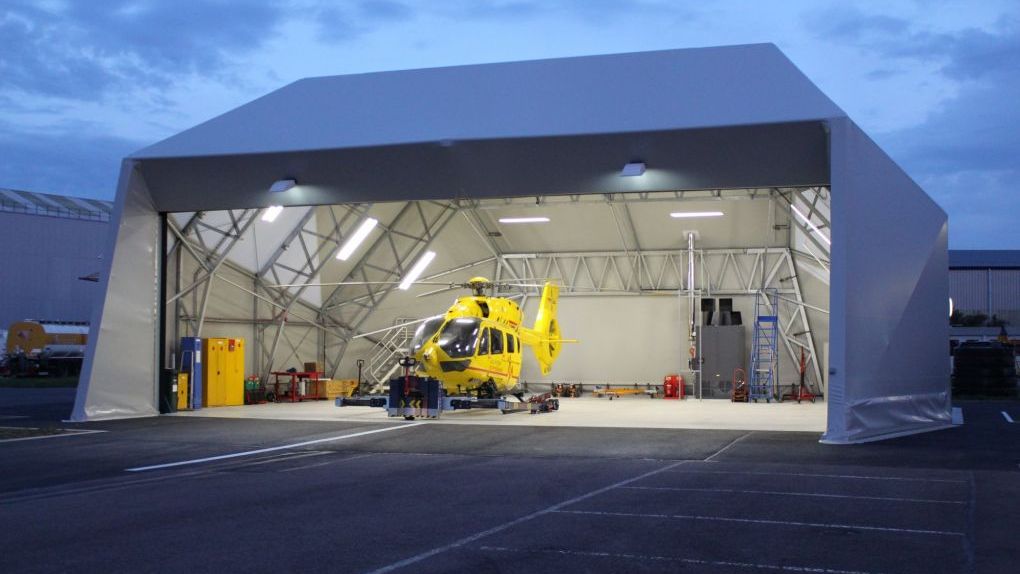
April 2007: An Appeal is launched to extend the service to Bedfordshire and Cambridgeshire
An appeal is launched to extend the service to Bedfordshire. The service became operational just four months later with a second BK117 in place covering Bedfordshire and Cambridgeshire five days a week with the call sign ‘Anglia Two’.
October 2007: Marshalls Airport in Cambridge offers us a permanent overnight base for Anglia Two. We ended the year operating both Anglia One and Two seven days a week.
2008: EAAA scratch cards were established for supporters, and EAAA was part of the National Geographic ‘Medics’ series.
July 2009: A dedicated team of critical-care paramedics were appointed to work solely on the aircraft.
August 2010: We celebrated our ten-year anniversary with increased fundraising activities, a gala ball, and a cookbook supported by top chefs and celebrities in our region.
December 2010: Paid doctors seconded from the NHS began to crew the helicopters, rather than using volunteers. This guaranteed the best possible clinical service 365 days a year.
March 2011: We moved from Sterling Aviation to Bond Air Services to start flying the Eurocopter EC135.
September 2012: EC135 T2, a fully night-capable helicopter is delivered to Cambridge to become the new Anglia Two.
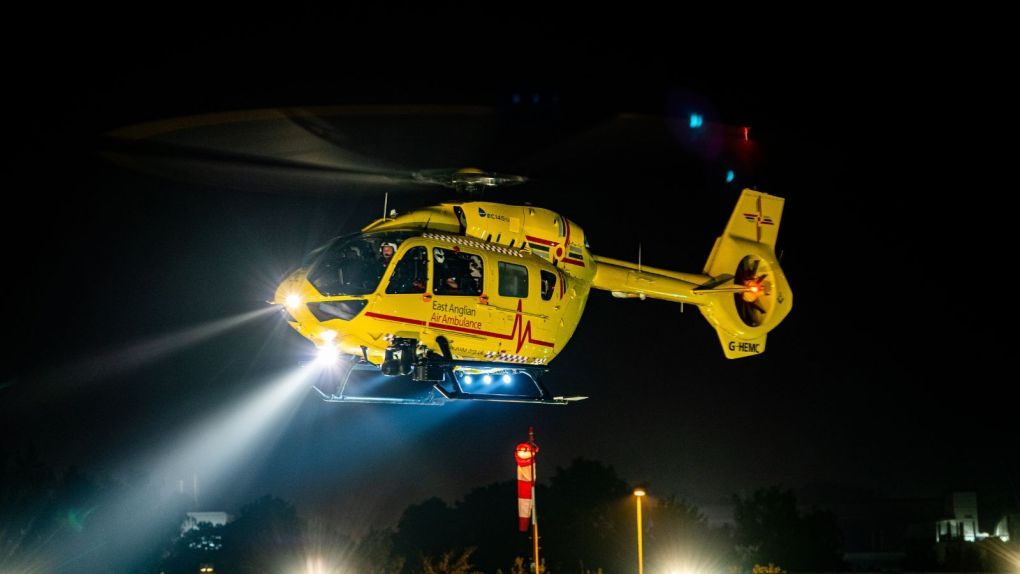
May 2013: EAAA is the first air ambulance service in the country to fly to unknown and unlit sites
EAAA is the first air ambulance service in the country to fly to unknown and unlit sites in the hours of darkness. Anglia Two begins flying 07:00 until 23:59 every day of the year.
April 2015: EAAA receive the UK’s first H145, improving our operational capabilities. The EC135 T2 is moved to Norwich to replace Anglia One.
May 2015: Anglia One’s flying hours are extended to cover 07:00 until 19:00.
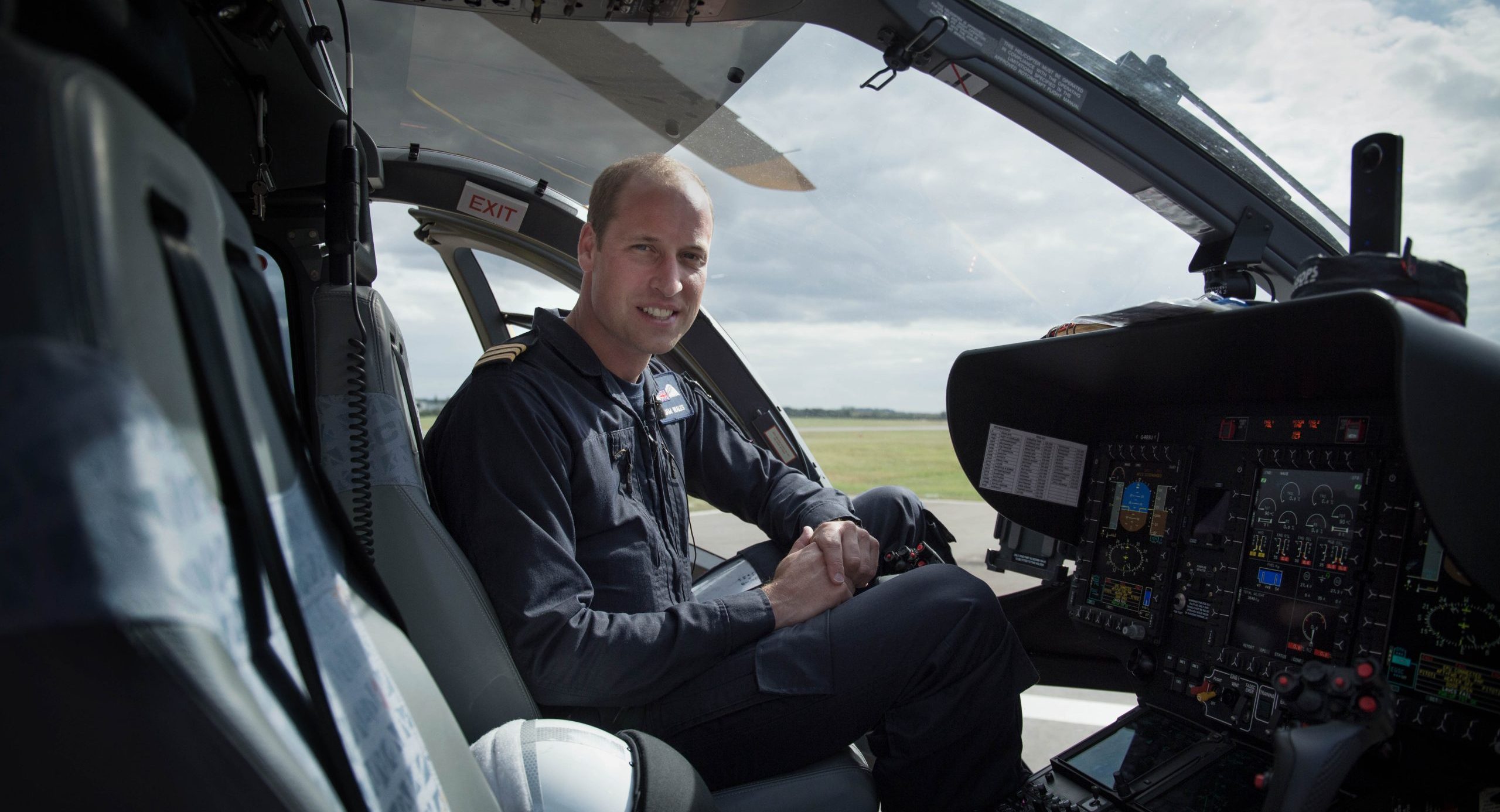
July 2015: The Duke of Cambridge, William Wales, has his first shift with EAAA.
November 2015: The East Anglian Air Ambulance furthered its commitment to encouraging bystander CPR by installing defibrillators at the Charity’s offices across the region. In addition, EAAA staff were trained in CPR and defibrillation. The defibrillators are locked in public access cabinets (CPADs) outside each office.
December 2015: The Charity’s clinical, operations, and communications teams based at Cambridge move into the new base at Cambridge Airport (Marshalls).
February 2016: Major General Sir William Cubitt has taken up the role of Chairman for the charity. Sir William replaces Andrew Egerton-Smith, who served the charity for over fifteen years, and stepped down in December 2015.
March 2016: East Anglian Air Ambulance hosted its first ever obstacle course race challenge event at the Elveden Estate near Thetford. Over 1,300 people from across the region took part in either the five-mile or ten-mile course. The event raised over £100,000 for the charity.
April 2016: Produced by Tern TV, an astonishing six-episode documentary captured the incredible life-saving work our doctors, paramedics and pilots achieve every day, bringing pre-hospital emergency medical treatment to patients across East Anglia.
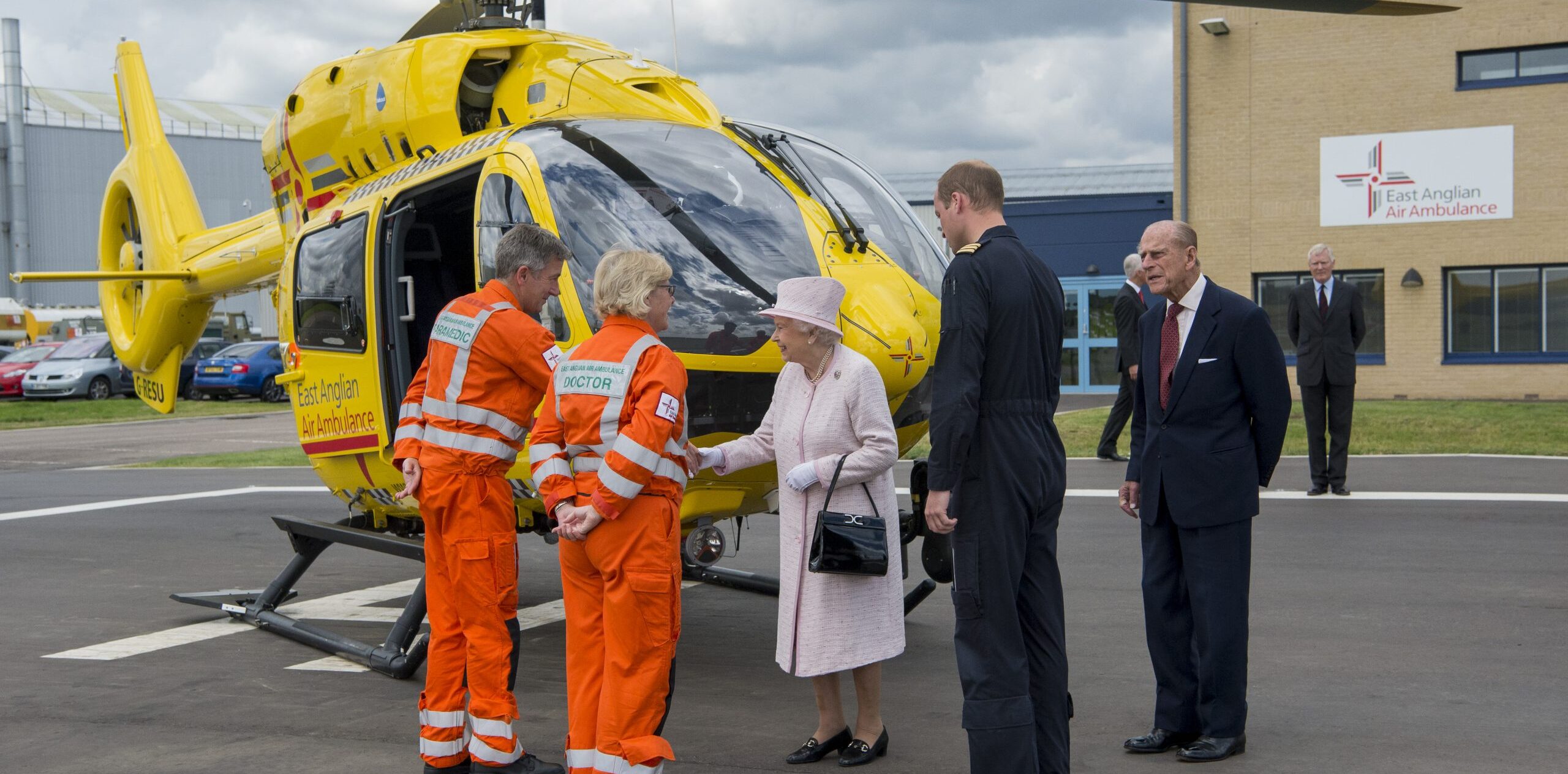
Her Majesty the Queen and HRH the Duke of Edinburgh visited EAAA
July 2016: Her Majesty the Queen and HRH the Duke of Edinburgh visited EAAA. During the visit, Her Majesty opened the charity’s new operating base, the Egerton-Smith Centre, which is sited at Cambridge (Marshalls) Airport.
The Queen and The Duke were given a tour of the new facility and briefed on the work of EAAA. The Duke of Cambridge showed them the H145 aircraft he flew for the charity. The Queen and The Duke then met some of the Charity’s volunteers, patients, crew and support staff. The Queen unveiled a plaque formally opening the new facility and met the founder of the Charity after whom the building is named, Andrew Egerton-Smith.
August 2016: EAAA appoints Doctor Pam Chrispin, Victor Inyang, Neil Berry and Jeremy Mauger to a PHEM consultant position and to also spend time overseeing EAAA’s governance. This involved developing the charity’s standard operating procedures (SOPs), equipment, future direction, training, and to provide on-call consultant advice.
October 2016: EAAA has equipped its crew members with body-worn video cameras (BWVC) to further enhance the standards of healthcare it offers. The Charity’s clinical staff are now wearing discreet body cameras when on missions throughout the East of England.
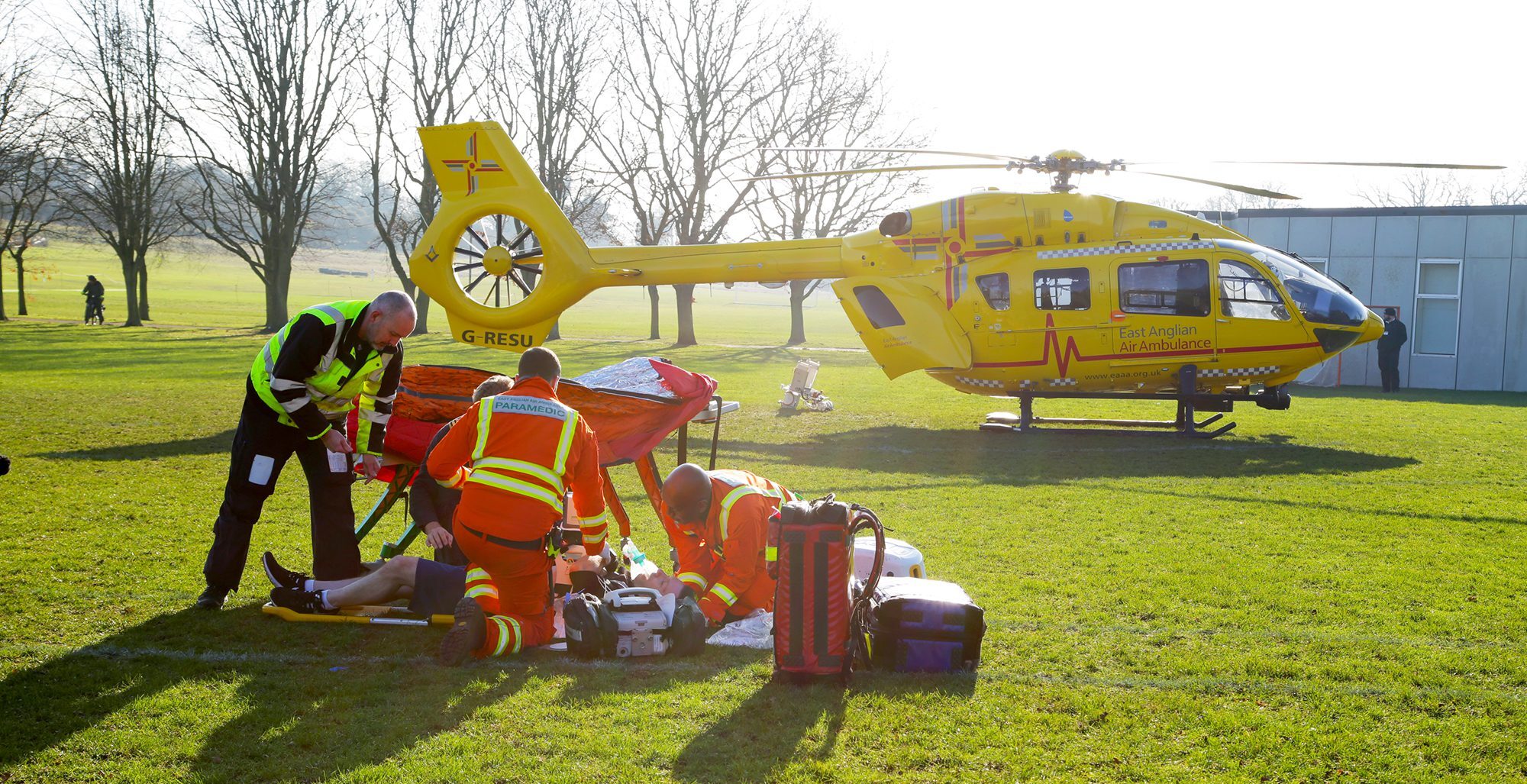
November 2016: EAAA flew its 20,000th mission
November 2016: EAAA flew its 20,000th mission and it almost went by without being noticed. The mission took place on Tuesday 29 November 2016, in Saffron Walden, Essex at 10:57pm. The incident was a road traffic collision and in attendance were Doctor Marcel Rigaud, Critical Care Paramedic Gary Spitzer with pilots Captain Gavin Blake and Captain Chris Sherriff. EAAA provided ground assistance to the EEAST team.
November 2016: EAAA took home three awards from the Association of Air Ambulance Awards. The awards, held in London, celebrated the life-saving work carried out by air ambulance charities across the country and honoured those who have made an exemplary contribution to the work of their charities.
March 2017: Gerry Hermer, one of EAAA’s founding members, and in recent years the aviation consultant for EAAA retires from his role.
March 2017: The Nembo Spider Ferrari left to EAAA by local businessman Richard Allen was sold at auction for £530,000 by H&H Classics at the Imperial War Museum, Duxford.
Racing driver and motor enthusiast Richard Allen who passed away in November 2016 could clearly remember the helicopter of EAAA coming to the help of one of his fellow race drivers after a crash, hence his generous gesture.
May 2017: The charity launched new Rapid Response Vehicles. Director of Operations at EAAA, Matthew Jones, said: “We can’t thank The ALBORADA Trust, and other contributors enough for providing the funds to purchase these vehicles, they provide us with another way to get to more patients in the quickest and safest way possible. We are also incredibly grateful to Hannah White for the time and support she has given to us to help showcase the new RRVs.”
July 2017: The Duke of Cambridge flies his last shift. “Thank you to my colleagues, team mates and the people of East Anglia who I have been so proud to serve. As part of the team, I have been invited into people’s homes to share moments of extreme emotion, from relief that we have given someone a fighting chance, to profound grief. I have watched as incredibly skilled doctors and paramedics have saved people’s lives. These experiences have instilled in me a profound respect for the men and women who serve in our emergency services, which I hope to continue to champion.
From the moment I joined, it was clear that I was a fellow professional, a Pilot with a job to do – in such a team there can be no other option, but still, I am grateful to my colleagues for accepting me so readily.” HRH The Duke of Cambridge, William Wales
January 2018: The Re-PHILL trial goes live in Norwich. The nationwide study run by Birmingham University Hospital, which aimed to determine whether giving blood in a pre-hospital environment improves patient outcomes in a trauma setting. This was a blind trial where participants (our team at EAAA) would not know what product they are receiving, minimising the risk of bias in testing the treatment.
March 2018: EAAA received a glowing CQC report. The CQC Inspection took place at EAAA’s Norwich base, with four areas highlighted as outstanding and no areas of improvement.
April 2018: EAAA were part of a new TV documentary ‘Emergency Helicopter Medics’. The series followed EAAA and two other air ambulance service providers.
April 2018: The Re-PHILL trial goes live in Cambridge. The nationwide study run by Birmingham University Hospital, which aimed to determine whether giving blood in a pre-hospital environment improves patient outcomes in a trauma setting. This was a blind trial where participants (our team at EAAA) would not know what product they are receiving, minimising the risk of bias in testing the treatment.
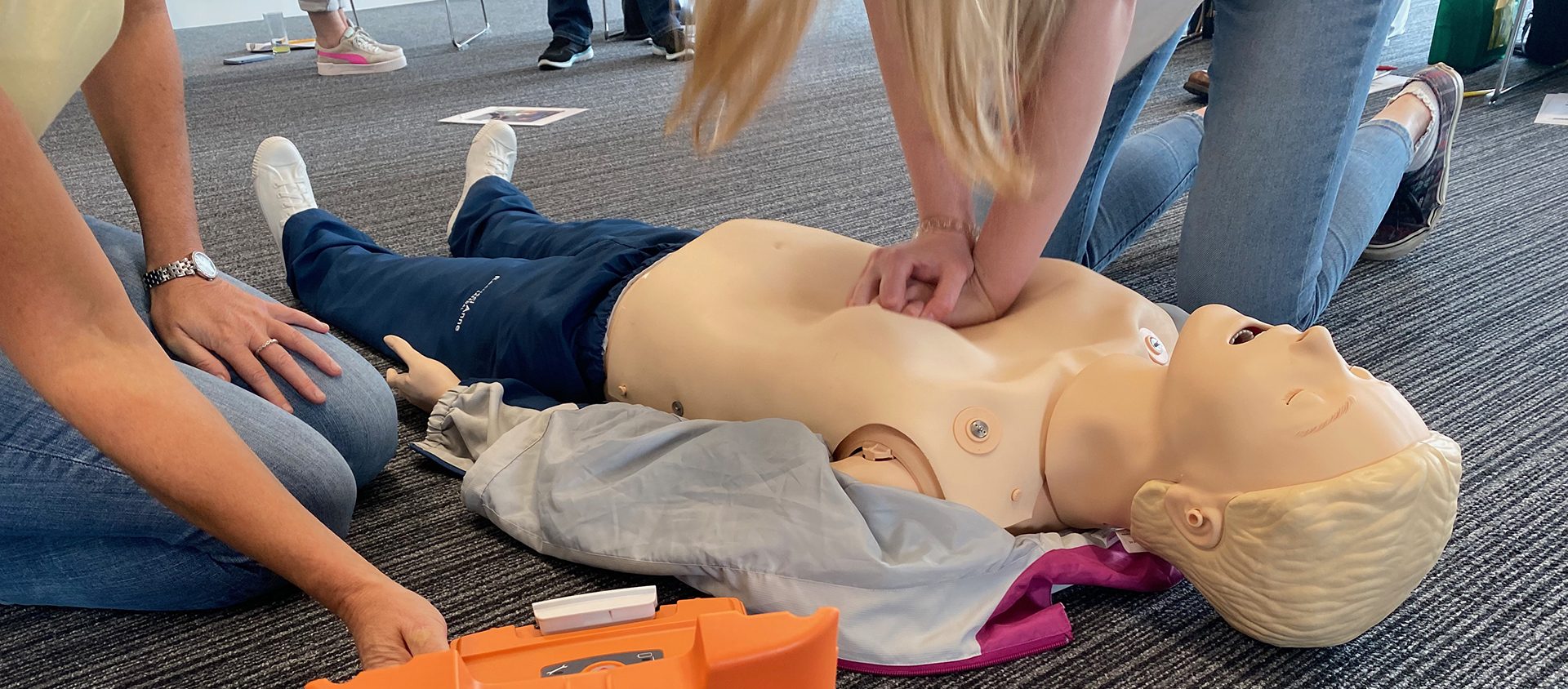
September 2018: EAAA launched our First Aid Training Programme
September 2018: EAAA launched our First Aid Training Programme. Our mission is to save more lives by minimising the impact of trauma and medical emergencies in the future through the delivery of first aid training to workplaces and community organisations across East Anglia. This later became our Community CPR Training Programme, which provides free training to communities across the region.
October 2018: One of EAAA’s founding members Gerry Hermer, received this year’s Sword of Honour from the Honourable Company of Air Pilots. Gerry was instrumental in the initial set up of East Anglian Air Ambulance, but his dedication to the whole aviation industry spanned more than five decades.
November 2018: Jen Easton, our longest standing member of staff, won Charity Staff Member of the Year at the Association of Air Ambulance Awards.
January 2019: EAAA flies 25,000th mission. While difficult to celebrate because it meant a patient has needed our care, we are delighted to reach this milestone figure, which highlighted the vital need for our service.
February 2019: We launched our ambitious plan to become a 24/7 helicopter emergency medical service (HEMS) provider by 2020. In 2019, we operated 365-days-a-year but not 24-hours-a-day, meaning that if an incident happens between midnight and 07:00 there was no HEMS provision in the region. We aimed to cover this gap and become a full 24/7 HEMS service by 2020. To do so, we needed to raise an additional £1 million a year to fund the operation.
April 2019: Our work towards 24/7 operations began in April 2019 with the introduction of doctors to our night shifts by rapid response vehicle. Our clinical teams saw an increase in taskings, use of doctor-only interventions, an increase in other advanced pre-hospital interventions (such as administering pre-hospital anaesthetic), and a decrease in total scene time.
July 2019: EAAA was awarded almost £800,000 from the Department of Health and Social Care. This funding, for capital projects only, was generated from a one-off £10 million grant made available to air ambulance charities in England in the 2018 Autumn Budget.
The funding of £790,313 was designated to help finance the following capital projects:
• The renovation of the charity’s Norwich Base, to enable its helicopter to fly 24/7.
• The purchase of two additional rapid response vehicles, which ensure the charity’s expert crew can access patients’ night or day, especially in built up areas, where it can be difficult to land the helicopter.
• The purchase of upgraded night-vision goggles to better equip the charity to fly 24/7.
• The installation of a new aircraft hangar closer to the Cambridge Base to increase service availability and allow EAAA to reach more patients.
• The installation of an immersive training suite for crew at the new Norwich base to better prepare clinical teams for challenging conditions on-scene.
July 2019: The Emergency Medical Journal published an EAAA research paper written in March 2019 alongside our colleagues at the Ambulance Trust, entitled: “Pre-hospital determinants of successful resuscitation after traumatic and nontraumatic out-of-hospital cardiac arrest.”
Authors Dr Ed Barnard, Daniel Sandbach, Tracy Nicholls, Alastair Wilson and Dr Ari Ercole reviewed data gathered between the 1 January 2016 and 31 July 2017 to review the outcomes of over 9,000 patients who had suffered an out-of-hospital cardiac arrest. Reported survival rates in countries with comparable healthcare systems are higher than the UK and the EAAA team hoped that by reviewing two areas in particular (survival to hospital admission and hospital discharge) it might help us, and the Ambulance trust save more lives.
August 2019: Our Aftercare team grew to include three clinical liaison officers, who worked with EAAA part-time to support patients and their families in different parts of the region. The service supports patients and their families in the traumatic aftermath following an incident which EAAA attended.
We saw a 25% increase in the number of patients who reached out to us or received aftercare support in 2019.
October 2019: EAAA features alongside Great North Air Ambulance and Thames and Valley Air Ambulance to document emergency call outs from June to August of 2019. Over the 11 episodes, Emergency Helicopter Medics will help to raise awareness of the vital role air ambulance charities play in getting the most critically ill or injured patients’ life-saving treatment in their moment of need and will show several incidents from the region. This was the third series EAAA has featured in the programme, which regularly pulls in more than 500,000 viewers per episode.
November 2019: On Thursday 14 November Norwich City Council approved the plans for our new Norwich base, which will be a huge a step forward towards our mission to fly 24/7.
January 2020: The works started to transform the hangar and office space and are anticipated to be completed in late 2020. The new base will provide essential rest and welfare facilities for the crew as they operate 24/7 and will future proof the organisation, by creating a space fit to house the Norwich-based charity and operational staff, under one roof, for many years to come.
The new base would also be equipped with a state-of-the-art training room to help the life-saving crews keep up to date with their vital training and will create a new community hub. The Hub would provide a better area for supporters and patients to interact with the charity, including a dedicated space to deliver essential CPR training to help save more lives out in the community.
March 2020: Thanks to the arrival of two new Volvo XC90 rapid response vehicles (RRVs), we became fully 24/7 by RRV from both of our bases, which meant our teams could be there for even more of our patients.
In April last year we introduced a doctor to join the single critical care paramedic (CCP) previously responding by RRV at night from Norwich for seven days a week (using a single vehicle 24 hours a day), and have now rolled this out in Cambridge as well and add an extra vehicle at each base.
March 2020: Inspired by the late air ambulance doctor Dr Carl McQueen, the McQueen Charter was a new initiative which aims to improve mental health and wellbeing in the workplace by helping employers to create safe, positive and open environments where staff feel their mental health is prioritised, able to discuss their mental health and are supported to access help if needed.
April 2020: As hospitals in the region reached capacity treating Covid-19 patients during the peak of the pandemic, EAAA were able to support the NHS. Its doctor and critical care paramedic teams adapted their normal HEMS roles to provide critical care transfers to assist the East of England Ambulance Service Trust (EEAST) in moving Covid-19 patients between hospitals, to ease the pressure on intensive care units.
The EAAA clinical teams had the specialist skills, equipment and extensive experience to look after ventilated Covid-19 patients outside hospital and were proud to be able to help in this way. The charity utilised its Cambridge-based helicopter to fly the medical teams around the region to man dedicated transfer ambulances, to take critically ill Covid-19 patients to hospitals with more intensive care capacity.
EAAA also temporarily adjusted its shift pattern at the Cambridge base so that the night team started earlier to provide more resource during daylight hours to assist with the transfers. The Norwich team was also equipped to support these transfers if required, and between the two bases HEMS missions were still fulfilled.
May 2020: Doctor Victor Inyang became Medical Director at EAAA. Victor, a well-known Emergency Medicine Consultant in the region, had been flying with EAAA for 16 years. He stepped into this role during the Covid-19 pandemic and was at the heart of leading the charity’s clinical work during the biggest medical crisis of our generation. Victor took over as Medical Director from Mr Alastair Wilson, who retired from EAAA after six years as Medical Director and an illustrious career in emergency medicine.
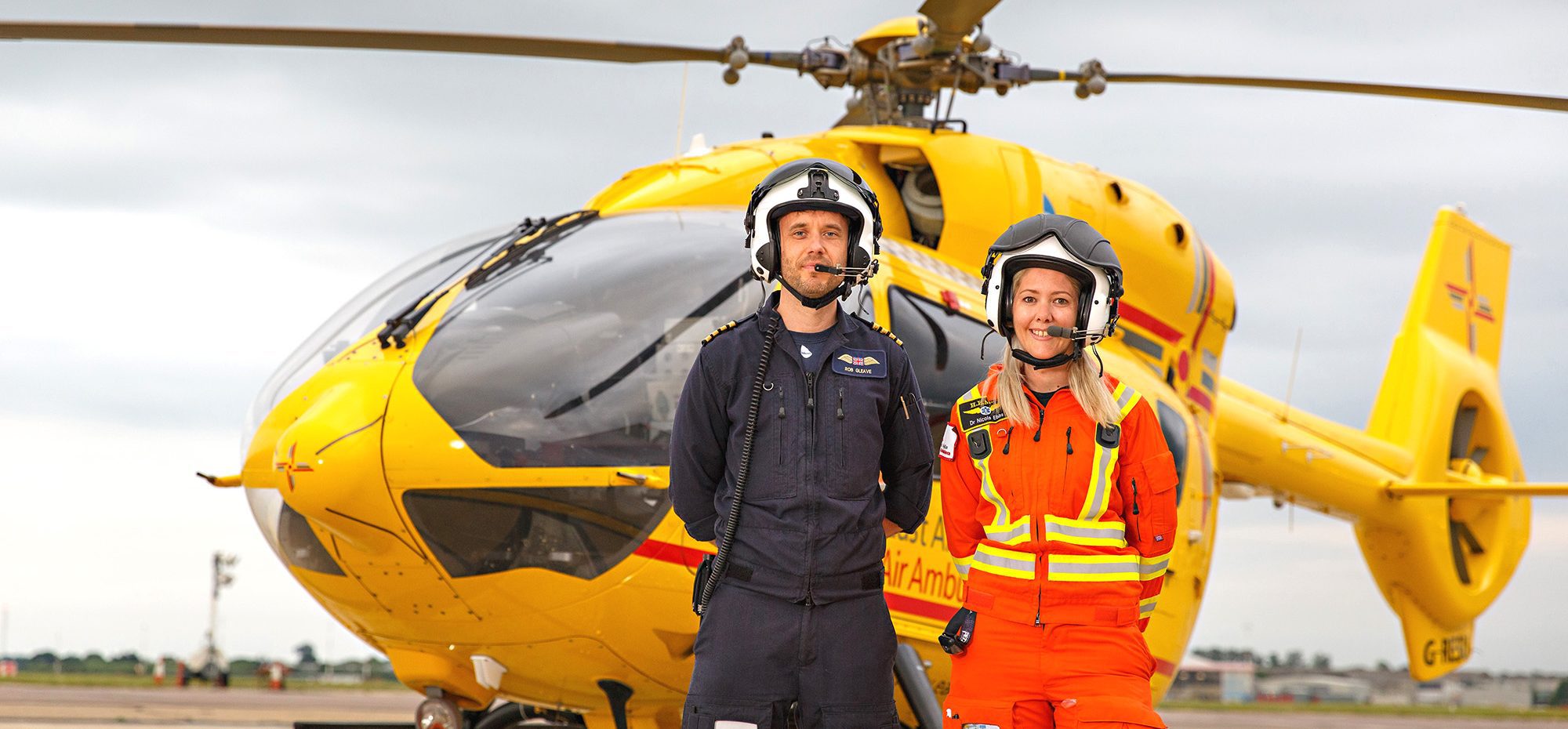
September 2020: Over 20 years we have flown almost 30,000 missions and helped almost 20,000 patients, all thanks to the generosity of our local region.
April 2021: EAAA CEO, Patrick Peal, announced in April that he will be retiring from the charity in June after seven years in the role. Patrick played an integral part in setting up the life-saving charity just over 20 years ago, led the charity as a former Trustee for some eleven years and has been the charity’s CEO since 2014. In that time, the charity has undergone a huge transformation and growth period in terms of fundraising income, operational achievements and becoming a top-rated local employer.
April 2021: EAAA staff begin to use new Norwich base. Funded through generous gifts in Wills, the £7 million development would enable the charity to finally have the training, rest and welfare facilities required for a fully 24/7 helicopter operation. Called Helimed House, the new Norwich HQ would also provide enough office space to house all Norwich-based staff under one roof for the first time, as well as a community hub and enhanced training and events facilities.
June 2021: East Anglian Air Ambulance was awarded the top spot in this year’s Best Companies list for the Charity Sector for its exceptional employee engagement and support during the pandemic. The charity has also been recognised as the 6th Best Company to Work For in the East of England in the 2021 listings and 14th in the Top 100 Mid-Sized Companies to Work For in the UK (for private companies and not-for-profits).
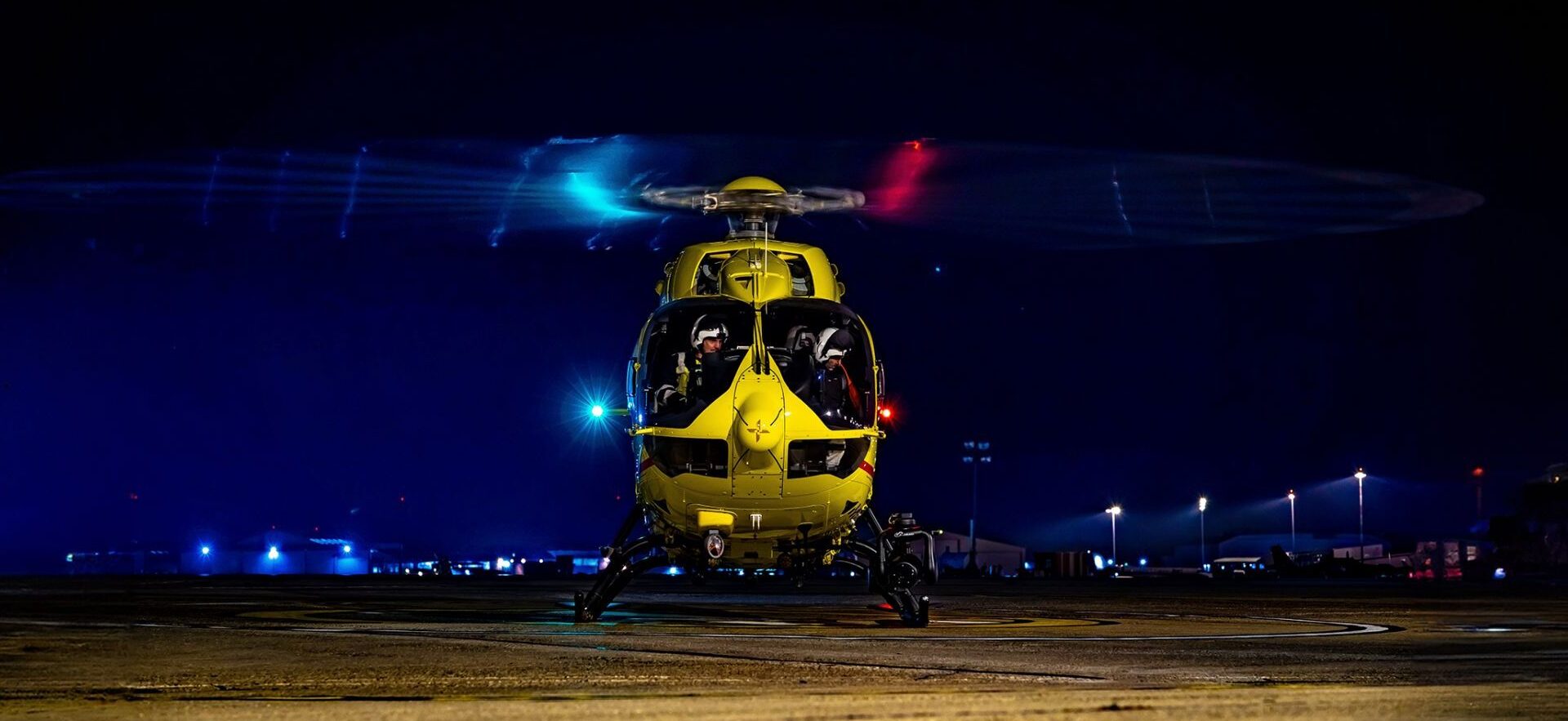
June 2021: EAAA starting flying 24/7 on 30 June 2021, becoming the first air ambulance in the East of England to do so.
July 2021: Previously EAAA’s Director of Operations, 1 July marks Matthew Jones’ first day as CEO following the retirement Patrick Peal after seven years as CEO.
Following an urgent fundraising appeal in May, EAAA was now able to permanently carry packed red blood cells and freeze-dried plasma on every mission. Blood transfusions ensure that the most gravely injured patients suffering a major bleed have the best chance of getting to hospital through increasing oxygen delivery and clot production.
September 2021: EAAA’s new Norwich base, Helimed House, was blessed and officially opened during Air Ambulance Week. 22 key figures representing the lifeblood of the charity, including former patients, donors, crew, a staff member and a volunteer, cut a yellow ribbon to officially open the base.
November 2021: EAAA’s RAID (Research, Audit, Innovation and Development) group held their first research and development conference ‘Breaking Barriers: National data sets improving collaboration and outcomes in PHEM’.
Led by Doctor Rob Major, RAID Chair, alongside EAAA clinicians, the conference boasted an impressive line-up of guest speakers, including Professor Tim Coats, speaking about TARN data sets and PHEM, Dr Nicholas Crombie, presenting on pre-hospital blood products and Dr Phil Hyde, providing an overview of PHEMnet.
February 2022: East Anglian Air Ambulance (EAAA) Anglia One (Norwich) is the first air ambulance in the UK to upgrade its Airbus H145 helicopter with a new five blade rotor head. This UK-engineering first would generate more lift, reduce vibrations and improve handling and stability, providing improved comfort for EAAA’s patients and crew as they operate 24/7.
June 2022: Former EAAA CEO, Patrick Peal, been awarded an MBE (Member of the Order of the British Empire) in Her Majesty the Queen’s Birthday Honours List.
October 2022: EAAA was shortlisted as a finalist in This Morning’s Emergency Services category in the Pride of Britain Awards.
October 2022: A TV documentary highlighting the work of EAAA gave viewers a special insight in BBC One’s ‘We Are England.’ The one-off episode, which aired on 28 October at 7.30pm, focussed on the air ambulance charity and its crews in a half-an-hour episode called ‘Saving Lives by Air’.
December 2022: East Anglian Air Ambulance (EAAA) Critical Care Paramedic (CCP) Neil Flowers became a Consultant in Pre-Hospital Emergency Medicine (PHEM) with the Royal College of Surgeons of Edinburgh. He was one of only three paramedics in the UK to be awarded this title. Neil is now recognised as a Level 8 Practitioner in PHEM by the Faculty of Pre-Hospital Care.
May 2023: EAAA celebrated national recognition after being named as one of the best places to work in the prestigious Sunday Times awards.
July 2023: EAAA and the Road Victims Trust (RVT) signed a Memorandum of Understanding to enhance the excellent working relationship that already existed between the organisations. This meant that EAAA patients and relatives could be formally referred, with their consent, to the RVT for specialist emotional and practical support through the grief and trauma of road death, or a serious or life-changing injury.
October 2023: EAAA was presented with an award for the Best Research Abstract at the 2023 European Emergency Medicine Congress (EuSEM), which was held in Barcelona.
Attended by 3,000 Emergency Medicine specialists from across the globe, a team from the EAAA Research Audit Innovation and Development (RAID) group was selected to present their abstract focussed on the determinates of survival after an out-of-hospital cardiac arrest witnessed by a bystander.
November 2023: Two new Rapid Response Vehicles (RRVs) were on the road supporting EAAA’s 24/7 life-saving service. The vehicles were a direct response to a specific fundraising appeal in 2022 to replace two previous vehicles, which had reached the end of their lifespan.
May 2024: EAAA marked the milestone of treating 25,000 patients.